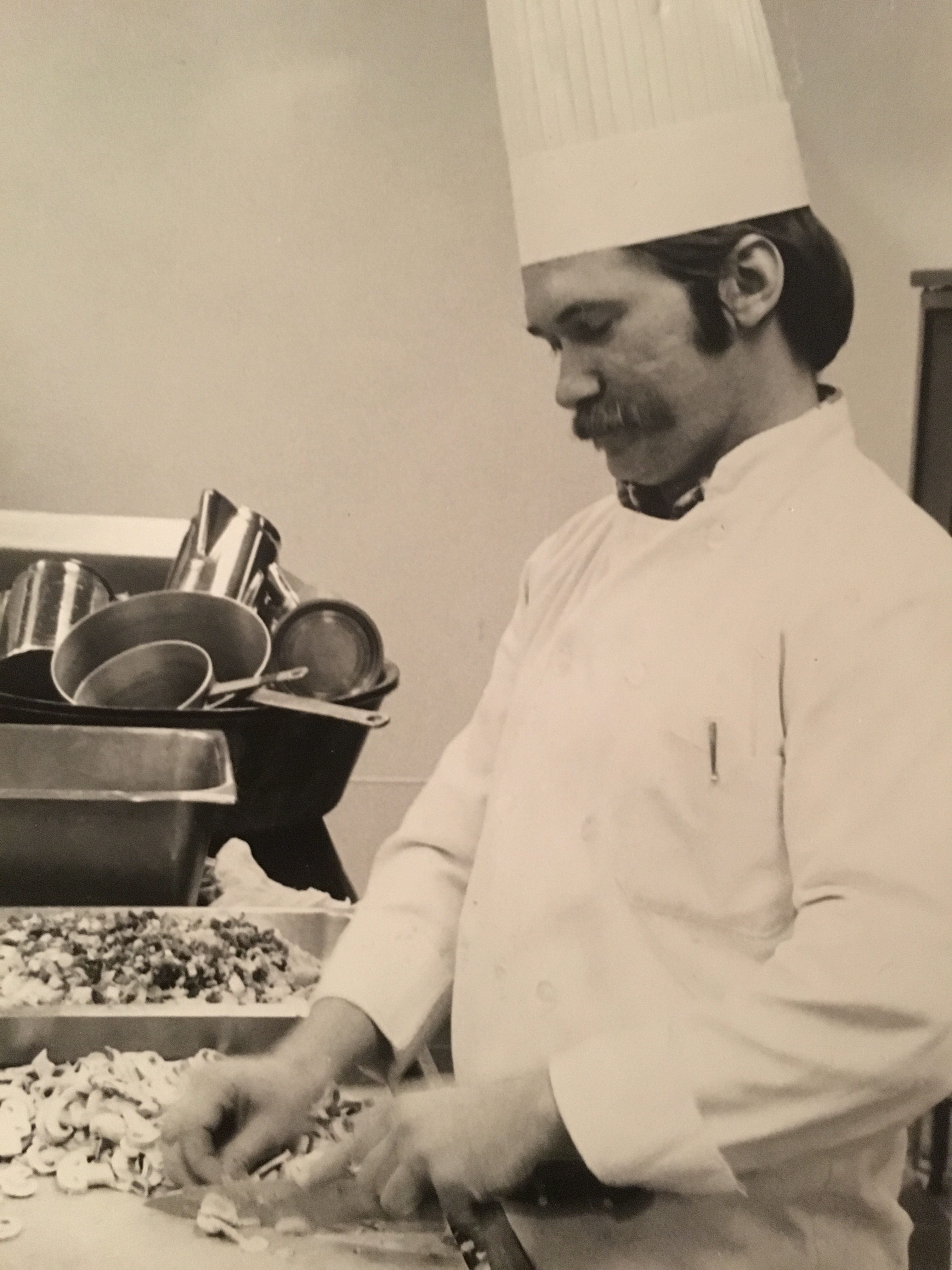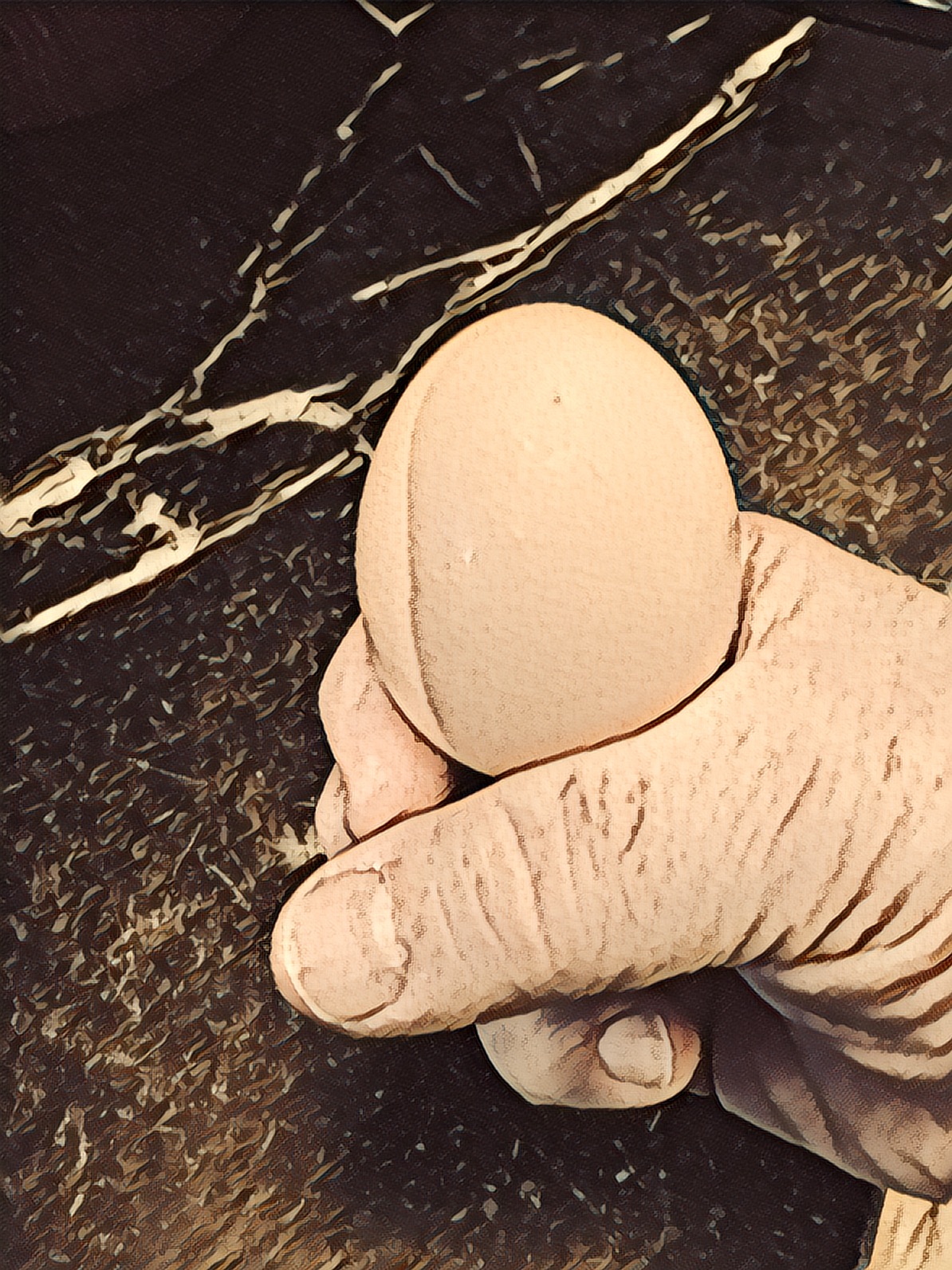
Cooks have a certain swagger that oftentimes hides a sense of pride in skill development from that first day in the kitchen. Maybe it was that entry-level first job at the age of 16 – that part time work as a dishwasher or fast food worker, or a series of progressive positions once cooking seemed to hold that spark of interest that could evolve into a future career – but in all cases under that growing façade of confidence is a sense of pride in those little things that inspire and motivate. Think back to those skills that may seem simple and automatic now, but at the time they were a revelation.

Cracking an egg is something that we rarely think about nowadays, but remember how gratifying it was the first time you mastered cracking and egg with one hand, separating the top and bottom of the shell to reveal the yolk and white, watching it hit a hot pan and realizing that the yolk would remain intact. From that moment on, this hand memory became part of your skill portfolio, a sign that you had mastered something simple, but important.
Think back to the practice that it took to finally reach that point when you were able to flip vegetables in a pan, watching the product lift briefly into the air and then gingerly lay back down as the pan was drawn back into position. No need for utensils to stir the product, a flip of the wrist is all that it took. Now something we do without thought was at that point a great accomplishment – check it off your skill list.
Learning how to build an edge, properly hold, efficiently guide a French knife and expertly cut vegetables to precise lengths and dimensions, would become a sign of your proficiency and confidence. Now we relish the role that that knife plays in our daily work and enjoy how fluid our knife skills have become. In the beginning it was so gratifying to reach that point where the knife became and extension of our hand.
Learning about caramelization (the Maillard Reaction) when the application of heat to the amino acids and natural sugar in an ingredient helped to bring out and enhance flavors, is life changing for a cook. Discovering that this is what defines that mouthwatering flavor of a grilled steak or chop, that mirepoix of carrots, onions, and celery, or the combination of exterior crunch to the soft, mouthwatering internal moisture of a hash brown potato, opens up so many doors to a lifetime of great cooking.
After watching the process numerous times and now holding that fillet knife in our hand, the chef gives us a chance to approach that whole salmon with the intent of removing the fillets. The knife is razor sharp and the trepidation is real as you make that attempt at hugging the bones while removing the fillets and minimizing any signs of valuable salmon behind. Those initial attempts were probably pretty sloppy resulting in less than stellar results, and maybe too much product destined for a salmon mousse. After those initial dozen or so tries you built up confidence, but not speed. After years of wielding that fillet knife you can now zip through that fish without even an ounce of beautiful pink flesh left behind. Check off another skill that sets you apart from the novice.

You were struck early on by the intoxicating smells of the kitchen. It was that veal stock simmering in large stainless kettles that wrapped itself around you and gave a sense of comfort to the kitchen. You would take a deep breath when you first walked into the kitchen knowing that that smell led to liquid gold that would eventually become a series of important sauces and foundation for featured restaurant soups. The stock was something even more important than that – the stock represented the chef’s desire to do things right, to respect the foundations of cooking, and to find ways to respect and use all of the ingredients in the kitchen as the magic of cooking turned them into something truly special. This was one of the first deep-seated foundational cooking skills that you were involved with. You discovered that a true stock was more than water, meat trimmings and vegetable peels, it was an exact product that included the caramelization of bones, the right proportion of mirepoix vegetables, a proportionate relationship of water to bones, the right temperature, and time. Once you understood this it became second nature and a treasured relationship that would stick with you throughout your career. Pride in doing it correctly would become a hallmark of your career, a signature of your professionalism.
Do you remember when the science of cooking became part of your repertoire? It might have happened without you realizing it, but it likely occurred the first time you pulled off a perfectly prepared hollandaise, beurre blanc, or mayonnaise. Process, temperature, a steady hand, and using an emulsifier like egg yolks brought science to life for you as a young cook. Now you approach this each time as a fully understood, natural process. Simple ingredients with an understanding of exactness yield a skill to be silently proud of.
Thickening a sauce can be approached in a variety of ways: modified starch, liaison of egg yolks, puree of vegetables or fruit, reduction, or a roux. All of these methods have their place – but that first time you really understood the role and importance of a roux was magical. When you realized that the amount of time dedicated to the cooking of a roux would impact the finished sauces texture and flavor, was a special moment. Not all roux is made equal and now you were in control.

Reflect back on how you struggled to learn how to pop open an oyster from that pocket in the back of the shell, or approach a littleneck clam with a clam knife after purging it in water, cornmeal and salt. Remember the fear that rushed through you, as the knife slipped into the palm of your hand leaving a cut that would remind you of your lack of skill for the rest of the night. Remember how you cursed and complained as you tried to hide your own doubt of skill as you struggled from bi-value to bi-value – until, you finally got it. Do you remember that moment? Do you remember how that next oyster became a sample of success as you allowed the muscle and the briny liquid inside an oyster to slide down the back of your throat? This was a celebration and a reckoning of why you became a cook. Check another skill off your list.
When the chef told you to attack that case of whole chickens and break them into eight pieces – you groaned in anticipation of a skill that you had yet to master. You took way too long to finish the job, but by the end of that task you were able to find those ball and socket joints in the legs, and swiftly slice the breasts off each side of the carcass without leaving valuable meat behind. The remaining bones would be used in that chicken stock that was ready to simmer in a 30-gallon kettle in the prep kitchen. Now busting out a case of chickens was just another well-developed skill that helped to make you a confident cook.
There would be so many other simple tasks to add to your portfolio along the way: turning a seven-sided potato, watching a popover spring to life with steam as its leavening agent, learning how to control the flames in a pan while deglazing with wine or liquor, slow roasting garlic until its bite sweetened with heat, whisking room temperature egg whites into beautiful peaks of meringue, trimming a tenderloin and hand cutting into perfect filets, folding a perfect omelet while an onslaught of orders click off the POS printer, and walking through the steps of a book fold on croissant dough that would yield hundreds of flaky layers. Each small process built your confidence, and your brand as a cook.
We take these acquired skills for granted now as our careers have progressed and the demands of our job have changed, but it will always be these skills that allow us to proudly hold the title of cook and have the ability to apply magical processes to the ingredients we are privileged to work with. We have come a long way, but every once in a while it is important to reflect back on that bag of tricks that gave us the confidence and the power to do what we do.
PLAN BETTER – TRAIN HARDER
Harvest America Ventures, LLC
Be all that you can be – be a chef
www.harvestamericacues.com BLOG
Photo #1: Forty years ago
Photo #2: Today we are going to learn how to crack and egg
Photo #3: Chefs Carroll and Beriau
Photo #4: Tableside sauce work at the CIA – Bocuse Restaurant

Leave a comment